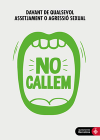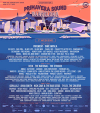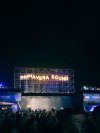



Ana Monroy Yglesias gets on the ground at Primavera Sound '22 to answer "What is the Feminist Sound?"
What does feminism sound like to you? Is it an anthemic Beyoncė song like “BREAK MY SOUL” or “Formation”? The loud punk pop protest of Pussy Riot, or the raw riot grrrl rock of bands like Bikini Kill and Sleater Kinney? Or is it the sound of chants at Women's Marches around the world, or a thoughtful speech on intersectional justice? Perhaps feminism doesn’t have a specific sound per sé, but instead, is the collective sound of a future where there is actually equality for all and diversity is a given.
Inspired by Primavera Sound’s commitment to booking a 50/50 gender split lineup for all their festivals from 2019 onward, I traveled to Barcelona for the massive music fest to explore what the feminist sound is. When Primavera Sound announced the 2019 lineup, they called it the New Normal, but for subsequent lineups, they simply implemented the split without calling it out. It feels important to have “experiential feminism” in spaces like this–huge, mainstream festivals–that are not just for women and femmes, but for everyone to experience.
While dancing through the first weekend of Primavera’s diverse musical acts, I asked a handful of fellow attendees about the 50/50 gender split lineup, and what they think feminism looks and sounds like.
Of the dozen people I interviewed, only two knew about the 50/50 gender split.
“I'm kind of glad that they didn't advertise the 50/50 split so heavily [this year], just because so many companies are kind of obnoxious about their DEI efforts. The more you market it, the less I believe that you actually care about it. So I think it's cool that it's sort of a natural part of the formula for them,” said Mike, an attendee from San Francisco.
Another one of the attendees I interviewed, Helen from Liverpool, also wasn’t aware of the gender split, and, similarly to Mike, is skeptical about diversity quotas actually having a meaningful impact on those they are meant to serve. “It is interesting to know [about the gender split], however, sometimes with things like that, I'm like, are you doing that for performance, like, "Hey, look, this is a half female lineup"? But are you creating a festival that's safe for women? Are you creating a festival where women [have somewhere they] can go if they are in danger? Yeah, have a 50/50 gender split lineup, but what else are you doing? That is cool. But I haven't seen a welfare tent.”
Her friend Holly (also from Liverpool) chimed in that she saw an “LGBTQ stall,” which was likely one of the two Nobody is Normal booths at the fest. Primavera Sound launched the Nobody is Normal campaign in 2019, after working with the Barcelona Town Hall and local venues to implement the No Callem (“We won’t keep quiet”) campaign against sexual harassment in nightlife. The booths are set up as a safe place to report gender-based hate or aggression. It is important for festivals and clubs to take a stand against harassment and promote a safe and inclusive environment for all. Yet, like those women, I didn’t know about the campaign or what those booths were for. In contrast, at Sónar in Barcelona, I learned about No Se Callem from signs with info plastered everywhere.


For myself and the fellow attendees I talked to, it was refreshing and exciting to see so many female acts serving up a wide variety of sounds and aesthetics. Yet, as many of the people I spoke with pointed out, it was frustrating to see the headline slots primarily occupied by white men. Of these nine prime-time main stage sets, only one was occupied by a woman, and only one of the eight male acts was non-white. In contrast, five of the 2019 headliners were women–four of them were Black women with one non-white male headliner.

Another festival goer, Holly, expanded on this, saying feminism is about “a lot of reeducating all these men who think it's like, ‘Women need to be on top, women need to have the upper hand.’ It is just about equality. And obviously, inclusion of [more than] white feminism.”
Feminism has evolved over the years and, thankfully, become more popular, inclusive and intersectional. During the second wave feminist movement of the ‘60s and ‘70s, it was more necessary for artists to labels themselves and their music as feminist to push the emerging movement forward. Many of the feminists involved saw the need to create women-run systems and women-only spaces to counter the patriarchal status quo. When folk singer/songwriter Alix Dobkin wore a “the future is female” t-shirt in 1975 and sung of lesbian love stories on 1973’s Lavender Jane Loves Women, as an openly lesbian and feminist artist, this was revolutionary. In her obituary, The New York Times called the groundbreaking album–which she released on her own women-run label, Women’s Wax Works–“arguably the first lesbian album.”
Dobkin was an active part of the alternative economy built by and for lesbian feminists, which included publishing companies, books and magazines, as well as “women’s festivals.” According to The Times, the largest was Michigan Womyn's Music Festival, or Michfest, which offered a city-like infrastructure in a forest with health care, workshops, crafts, food and music for thousands of women each year. As attendee Diane Anderson-Minshall explained in 2015, “It’s the first or only time we’ve ever felt truly, 100 percent safe from harassment, objectification, judgment, violence, rape.” The event made the man-free lesbian utopia of Dobkin’s music a reality, but not for all women. In 1991, Michfest kicked out a trans woman attendee, and instead of addressing ongoing demands to become more inclusive, they hosted their final, fortieth event in 2015.
In the late ‘90s, Sarah McLachlan challenged the male-dominated music festival circuit with Lilith Fair, a touring fest featuring all-women performers, around 300 artists, that brought in over 1.5 million revelers to massive outdoor venues across North America. Lilith Fair occurred during the summers of 1997 through 1999, grossing over $52 million (with $10 million donated to women’s charities during its 130+ tour dates). After the first year was critiqued for being too white, McLachlan booked more women of color, including headliners Erykah Badu and Queen Latifah, as well as a young “trash-bag”-suit-donning Missy Elliot. The festival was for everyone, and was a safe space for women. As longtime music critic Ann Powers told Vanity Fair in a 2017 oral history of the fest, “I had been a working music critic for so many years by that time, and to go to a music festival when you’re a young woman is to be harassed…To be in a space where that just wasn’t a factor was a huge relief.”
It is still important to curate spaces that are explicitly for women and gender non-conforming people, along with spaces that focus on uplifting and celebrating women. Additionally, integrating feminism into all spaces feels like the way of the future. What would the music festival landscape look, feel and sound like if all events had a 50/50 gender split?
“Feminism in a nutshell, to me, is really around equal access to opportunity, equal compensation, autonomy over our bodies, really just equal human rights across different categories,” said Jade, a festival-goer from Park City. “In terms of Primavera or anywhere where there are artists being represented, it's important that it's equal, and not just the invites, but more so which stages they're on and what set times. I'm focusing on women in this question, but obviously it’s a larger issue than women, we have non-binary artists as well. But female artists can't just be a diversity category. Let's [also] bring different types of music in or different representation in terms of craft.”
The female artists at Primavera 2022 were captivating and diverse. There was the powerful yet soft presence of Sharon van Etten and her all-female band, the stage-filling energy of Charli XCX, and the queer Black queendom of Big Freedia. There was also the tongue-in-cheek humor of alt-rock newcomers Wet Leg, the sexy and atmospheric rock of Warpaint, and the explicitly feminist and deeply joyful songs of Les Amazones D’Afrique. I lived for the drama and feminine power of María José Llergo’s flamenco, enhanced by her female dancers delivering artistic modern-dance-meets-flamenco moves.
“It was really nice with Wet Leg, to see two girls on guitar at the front. When I was younger and started playing guitar, it would have been quite inspirational to see that.” said Lucy, a festival goer from Scotland “I would have been like, ‘Yeah, I'm gonna be like them, dress like them, talk like them.’”
To Noah, a young trans woman from the Netherlands, “Feminism sounds like a SOPHIE song.”
And as she points out, we need men for feminism to work. ”I'm gonna be real with y'all. The problem is men. Ever since I transitioned to a female, I've been having so many problems with men and their masculinity. I get approached by men so much, and they have the balls to send dick pics and stuff. As women, if we want to be equal, we’ve got to start by saying to men, ‘Hey, stop pulling that shit. Stop sending dick pics to chicks. Stop approaching women with weird comments. Stop insult culture, stop all that bullshit.’ We should all be equal.”
To me, feminism is about actively advocating for equality, and bringing those dialogues and actions to your daily life. I also think feminism is about being authentically you, and feeling safe to express the multiplicity of who you are, while creating space for others to do the same. Even when I don’t preface that I am a feminist, it is still an essential lens with which I view the world. As a cis-gender white woman, my vantage point and lived experience cannot represent all feminists–no one person is the definitive voice or sound of feminism, and I think that's the point.


